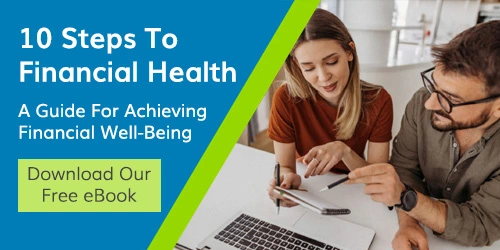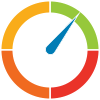FAQs
CREDIT
Should I close a credit card if I’m not using it?
No. Closing an account with a zero balance can impact your credit utilization ratio and lower your credit score. To learn more, check out our blog post.
What is a credit utilization ratio?
Your credit utilization ratio shows the percentage of your available credit that you are currently using. It is also a key factor in determining your creditworthiness. To calculate your credit utilization ratio, you simply divide the total amount of credit you’re using by your total available credit, or you can use our free credit utilization calculator to determine your ratio.
When can I apply for a credit card?
Legally, you must be at least 18 to apply for an unsecured credit card, but that doesn’t mean you’re actually ready to get one. Before applying for credit, be sure you have a steady income and can stick to a budget. Never treat your credit cards like free money and pay your balances off in full whenever possible.
Which repayment strategy is better: debt avalanche or debt snowball?
Both repayment strategies have pros and cons. The snowball method focuses on paying smaller debts first, giving you a sense of accomplishment. The avalanche method tackles balances with the largest interest rates first, which saves you money over time. Regardless of which you choose, you’ll need to remain committed to the process and refrain from adding any new debt to your balances. You can learn more about both repayment strategies here.
How do I get a free copy of my credit report?
By law, you are entitled to a free copy of your credit report every 12 months from each of the main credit bureaus – Equifax, TransUnion, and Experian. You can request your report through each one separately or visit AnnualCreditReport.com. In addition to the free annual report, all three bureaus are offering free weekly credit reports, too.
How long does negative information stay on my credit report?
Generally, negative items, such as late payments or settled accounts, will remain on your credit report for 7 years. A bankruptcy will show for 10 years. If you have a lawsuit or unpaid judgment against you, that will remain for 7 years or until the statute of limitations expires, whichever is longer.
Which types of information can I dispute on my credit report?
You can file a dispute for any inaccurate information you find on your credit report, including:
- Incorrect contact information. Be sure the names, phone numbers, and addresses listed belong to you.
- Account status errors. You’ll want to dispute any incorrect account status, such as an open account marked as closed, or an account in good standing showing as delinquent.
- Balance or limit mistakes. If an account balance or credit limit is incorrect, dispute this with the credit bureau as it can impact your credit utilization ratio.
Unfortunately, any accurate negative information cannot be removed.
What is considered a good credit score?
Per Equifax, there are five credit score tiers:
- Excellent, 800+
- Very Good, 740-799
- Good, 670-739
- Fair, 580-669
- Poor, 300-579
If you have a score between 670 and 739, your credit is considered good.
Is my credit score the same as my FICO® score?
They are both essentially the same thing. Your FICO® score is a type of scoring model based on various factors. Each credit bureau uses these same factors to determine your score.
What’s the difference between a soft and hard inquiry?
A soft inquiry won’t impact your credit score and can only be seen by you. A hard inquiry can be seen by lenders and may impact your credit score. This typically happens when a new lender pulls your report during the application process.
How do credit bureaus determine my credit score?
Several factors are considered when determining your credit score, including:
- Your payment history
- The amount of debt owed
- Your credit utilization ratio
- How long you’ve had credit
- The number of new accounts
- Overall credit mix (different types of credit)
Your payment history carries the most weight when calculating your score.
Will checking my credit report hurt my score?
No. This is considered a soft inquiry.
How often should I check my credit report?
At a minimum, you should review your credit report annually. If you’re applying for a car or home loan, or financing a home project, it’s also a good idea to pull your report a few months in advance to ensure everything is correct. You should also pull a report if you suspect you’re a victim of identity theft.
Are there any rules about when a collection agency can contact me?
Yes. Unless you agree otherwise, they can only call between 8 AM and 9 PM. These calls can’t exceed seven times within a week. Once you talk to the collection agency, they must wait seven days before calling you again. If they contact you by email, text, or social media messenger, and you ask them to stop, they must halt communications through those channels. Additionally, if you tell them you are unable to receive calls at work, they cannot call you at your workplace.
Can I ask a collection agency to stop contacting me?
Yes, but it must be in writing and should be sent by certified mail. Once they receive your letter, they may only contact you to confirm receipt or alert you to impending legal action. If you are working with an attorney, notify the collection agency immediately as they are required to communicate with them moving forward.
How do I report a collection agency that has broken the rules?
You can contact your state’s attorney general’s office for assistance. You may also file a complaint with the Federal Trade Commission and Consumer Financial Protection Bureau.
DEBT CONSOLIDATION
Which types of debts can I consolidate?
Generally, you can consolidate the following types of debt when getting a debt consolidation loan:
- Credit card debt
- Medical debt
- Unsecured personal loan debt
- Private student loan debt
- Payday loan debt
Although federal student loans are unsecured debt, they cannot be consolidated with other types of debt. For information on federal student loan consolidation, please visit Studentaid.gov.
Can I save money with debt consolidation?
It is possible to save money if your debt consolidation loan has a lower interest rate. For example, if you have $48,000 of debt at an APR of 21.65%, you could save $17,953 by getting a 4-year debt consolidation loan at 13% (including 5% loan fee/points). Assuming you’re making payments of $1,300 a month, the new loan would lower your monthly payment by $12. You would also be paid in full 14 months sooner than making minimum payments at the current rate.
If you don’t get a loan at a lower interest rate, however, you could end up paying more over the life of the loan.
Does debt consolidation hurt my credit score?
Although you may see a small dip initially, over the long term it will improve your score if you make timely payments and don’t take on more debt.
Is good credit required to get a debt consolidation loan?
Those with higher credit scores are more likely to qualify for loans with lower interest rates. If you have a low credit score, the options may be limited, and your interest rate will likely be higher. In some cases, debt settlement may be a better option if you are unable to secure a loan.
Are there any risks with taking a debt consolidation loan?
Yes. One of the biggest risks is not addressing how you got into debt in the first place. If you don’t make a budget and stick to it, you could easily find yourself in even more debt after taking out the loan.
Additionally, many loans come with upfront costs, such as loan origination fees and closing costs. Be sure to factor these in when deciding whether a debt consolidation loan is worth it.
Is debt consolidation better than debt settlement?
Debt consolidation is a good option for those looking to lower their interest rates and combine several debts into one payment. Fees for consolidation also tend to be much lower than those associated with settlement services. Although you still have to pay your balances in full, you typically save money in interest fees. Unfortunately, if you’re already behind on payments and your credit score is low, this may not be an option for you.
DEBT SETTLEMENT
How much can I expect to save using a debt settlement service?
According to a 2020 report commissioned by the American Fair Credit Council (AFCC), most people save an average of $1,700 per settled account after fees are deducted.
How long does debt settlement take?
Most debt settlement services take 24 to 60 months to complete. It’s a long process and not a quick fix. If you need relief sooner, other debt-relief options, such as bankruptcy, should be considered.
Will I have to pay taxes on any debt settlement amount?
Any forgiven amount over $600 is taxable. Be sure to check the details of your agreement to see if any applicable taxes are covered or if these will need to be paid separately when you file your return.
Can you guarantee that all my creditors will settle for less than I owe?
Unfortunately, we can’t guarantee that every creditor will agree to settle your debt. Some creditors refuse to work with debt settlement companies. If you stop paying them, some creditors may decide to pursue legal actions against you and refuse to negotiate.
Will debt settlement negatively impact my credit score?
For debt settlement to work, your accounts will need to be in a delinquent status. This will negatively impact your credit score. After a settlement is reached with a creditor, it will be reported to the credit bureaus and may harm your score. Over time, however, your score will improve if you keep your debt low and make timely payments.
What fees are associated with debt settlement services?
There are several fees you may be charged when enrolling in debt settlement services. Some of these cannot be collected until a settlement is reached. For example, most charge a fee based on the amount of debt enrolled or settled. This typically runs about 25%. Additionally, there may be set-up and monthly maintenance fees which are charged upon enrollment and vary by company. These generally cover escrow accounts where your funds are kept until a settlement is reached.
If I enroll, will the calls from creditors stop?
Although we’d love to say 100% of the calls will stop, we can’t guarantee it. Once an account is settled, the calls from that creditor should cease immediately. While we are negotiating, however, you may still get calls from creditors and collection agencies.
Will interest still accrue on my accounts while going through the debt settlement process?
Yes, interest will still accrue on your accounts. This amount will also be included in the settlement offer when negotiating with your creditors.
Can I negotiate with my creditors on my own?
Yes! Many people opt to negotiate on their own to avoid settlement fees. Just be aware that it’s very time consuming and requires good negotiation skills.


